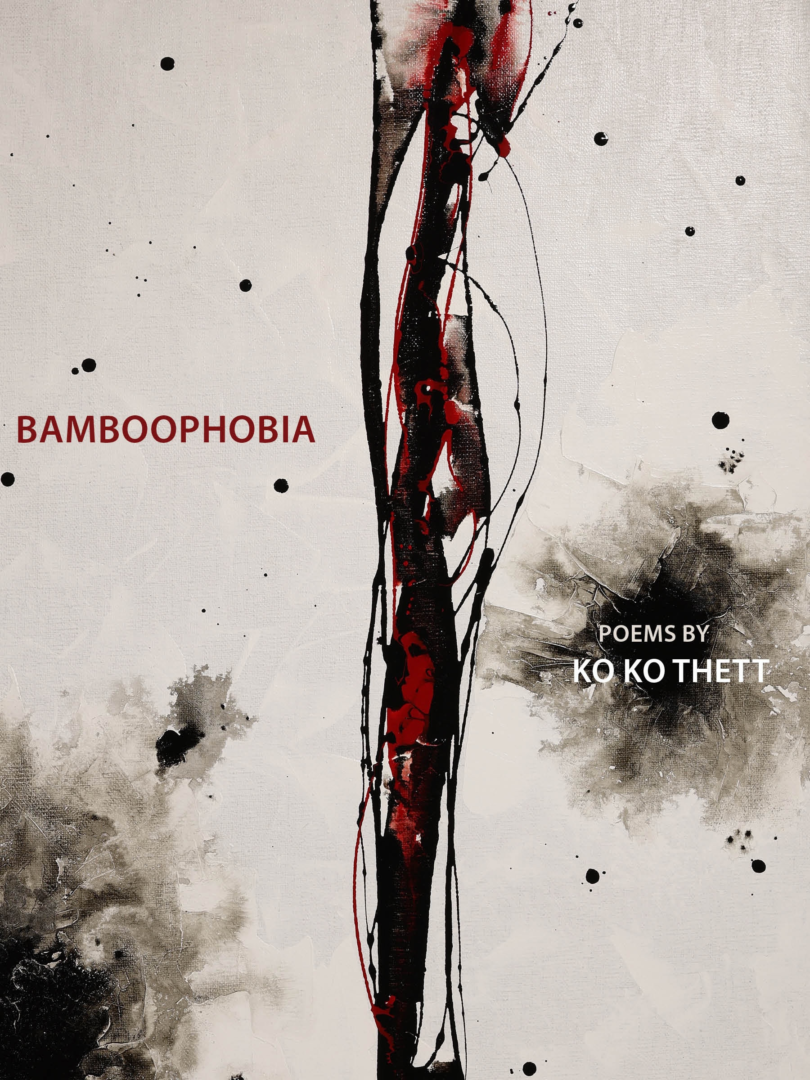
To read ko ko thett’s Bamboophobia is to walk, crawl, and stumble through a grove bursting with the slipperiness of language and the absurd violence of forced nationalism: when an authoritarian government terrorizes peoples into conforming into their brand of national identity. And then suddenly, you find yourself in unexpected clearings: dark humor, chilling and deliberate absences of history, sets of self-translated parallel poems of Burmese and English otherwise ensconced among English texts. Bamboophobia is not merely a volume of poetry—it’s a state of being.
“Accent” starts the journey with what you see versus what you hear: “My skin is my landscape, my accent my fresh air.” The narrator poses a binary question between these two aspects of identity, “Which is truer, my skin or my accent?”, then smashes it with the sarcastic answer: “When it comes to swinishness they are on the same page.” The immediate response and comparison reveals the narrator’s awareness of their appearance and voice on other people as well as their cool impenitence, qualities necessary for the traumas of history and tergiversations of language that lie ahead.
Several more poems in, we come to “ကော်ပတာ” / “Copter”, our first set of poems with Burmese on the left page, English on the right, originally written in the latter and translated into the former by the poet. These parallel poems and the other sets like it exist as clearings that give the reader pause: eyes travel between alphabets, observing the curls of letters coalescing into words. Ironically, the bellicose velocity of a helicopter is slowed down by the multilayered nets of lines, letters, words, images. Instead of the copter as savior or warrior, a symbol so prevalent among Western narratives of Southeast Asia, it becomes a concept captured by language. This capturing-through-language becomes an act of defiance further compounded by thett eschewing connotations of its imperialist hard power but still focusing on the vehicle’s exploitative history: “Copter people are light travelers. There’s only one class on copter—business. You don’t need to line up to board a copter.”
The nightmarish intrusion of nationalism and corrupt politics continues to sprout. “Amongst the world’s marvellous marbles” delivers a horrifying monologue of an abusive megalomaniac figure, one who states “I am the Patron Saint of Your Party” and concludes with the deathly ominous: “I spin so fast history can’t catch up, let alone blackmail me for a rest.” “Political silence” unapologetically diagnoses the failed state: “They redress their national internal bleeding with quacky tincture. There’s no cure for national internal bleeding.” “I voted for irony” asks, “Haven’t I already terrorized your image-nation between iconoclastic and romantic notions?” This line gifts us the fascinating word “image-nation” – is this a nation so superficial that it relies solely on images to sustain itself? Or have images collected so much power that their accrual /curation forms a political body? What are the relationships between images and nation, and how do they feed upon each other? In Bamboophobia, the relationships seem cannibalistic, starving, contaminated. The poem concludes with the narrator’s own dilemma concerning not merely their poetry or activism, but the very notion of having a voice heard and witnessed by others: “I don’t want to work language from the outside. Like a fresh corpse dissolved in language, I want my tongue dissolved in lye. But what lye?”

From a macro to micro level, the torments of language circulate throughout the politics as well, often paired with dark humor or a sardonic tone. Using the language of art museums in a bulleted form, the poem “Twelve art project proposals in Ai Weiwei-like proportions” pokes fun at the voyeuristic and often nonsensical nature of the art world intersecting with activism on a large public scale. “Final report by the Supreme People’s Emergency Inquiry Commission [Classified]” is a poem created out of a bureaucratic register, complete with nonsensical checkboxes and signed off by “The Democratic Supreme People’s Republic of Dukkha.” poems play with the elusiveness of literary devices in “Metaphors,” opening simply with “They don’t explain. They don’t connect.” A few stanzas down, as if these words were scried from a body of water: “Kidney is bean. Sunshine is lady. Chickpeas peck on peachicks. Aren’t they only doing their duty?” Kidney as organ, kidney bean as vegetable; the tension of reading silently versus reading aloud a tongue twister; and who does “they” refer to – the peachicks, the sunshine, the beans – the metaphors themselves? This line has the potential to give the reader a delighted frustration in the puzzling nature between word and meaning, the whole poem itself a playful yet serious conversation between a word-lover and their fickle beloveds.
Towards the end of the collection, “Bloody tongue [at language’s edge]” sprawls across pages, recalling earlier poems of the bulleted lists with more spaciousness between items and meditating on pain with the cadence of dripping liquid: “When the mother tongue embraces you like a failed state, she will never let you off. Bloody tongue, they say, is the sword of destiny against “the wooden tongue” of tyranny. Yet, history has proven that it is the bloody tongue that gets cut after cut after cut after cut after cut. Again and again and again and again.”
And yet after all the torture, coercion, confusion, laughter at (or despite) despair, the collection concludes with the paradoxically titled set of parallel poems, ဒဳမဝၣံငၲခငၲ / “Before that” of a lone character who seems to be contemplating a decision or a place, as “Determination told him he must reach there.” The final image leaves the reader with the sounds of the ocean, the feel of thick mist, and strangely enough, the absence of “half-light,” a sensation of negation, as if we are both holding and standing within the immaterial interior of a husk—perhaps the hollow tube of bamboo itself. Such is the state of being of ko ko thett’s Bamboophobia, a volume of poetry well-aware of its movements through history’s bloody tongues and language’s strange, wild groves.
Bamboophobia
by ko ko thett
Zephyr Press, $16

Amanda L. Andrei is a playwright, literary translator, community archivist, and theater critic based in Los Angeles. She writes epic, irreverent plays that center the concealed, wounded places of history from the perspectives of diasporic Filipina women, and she translates from Romanian to English with Codin Andrei, her father. Recent translations include Tatiana Niculescu’s Brancusi v. United States and Oana Hodade’s Scenes from the Life of the Family Stuck. MA: Georgetown, MFA: University of Southern California. www.amandalandrei.com


